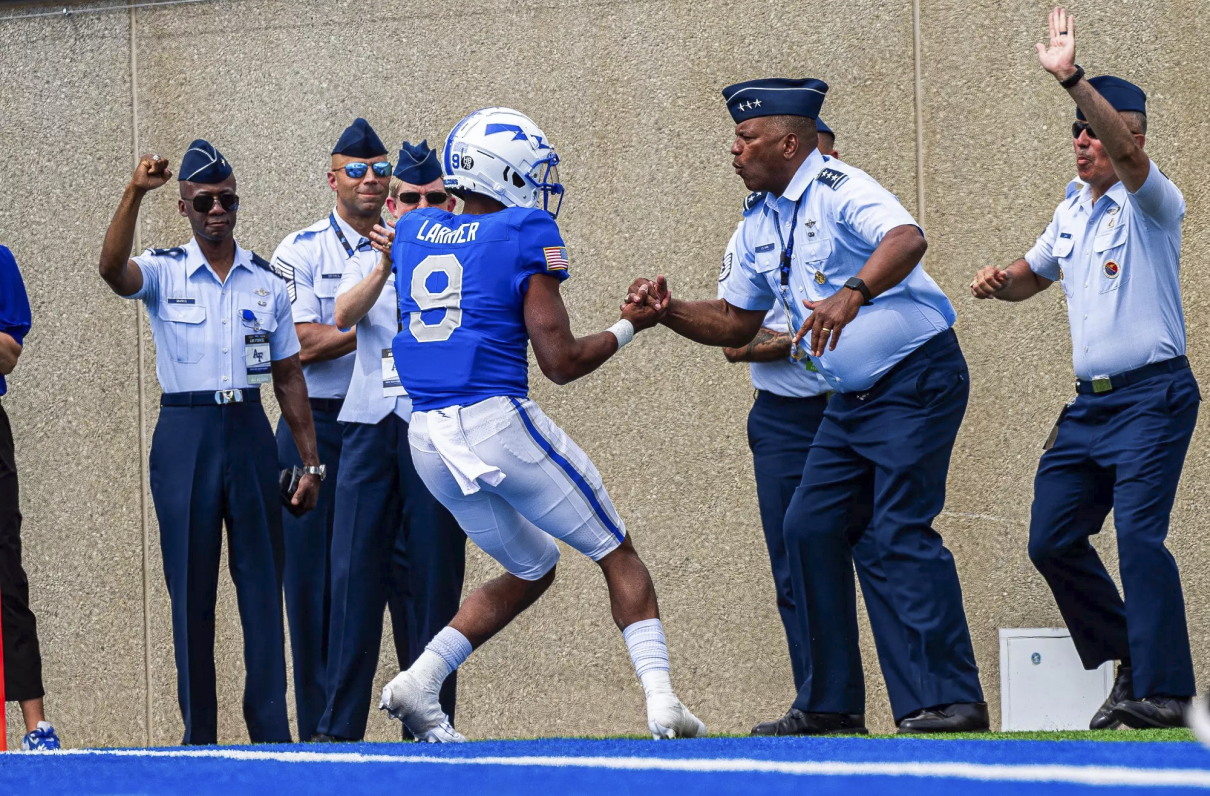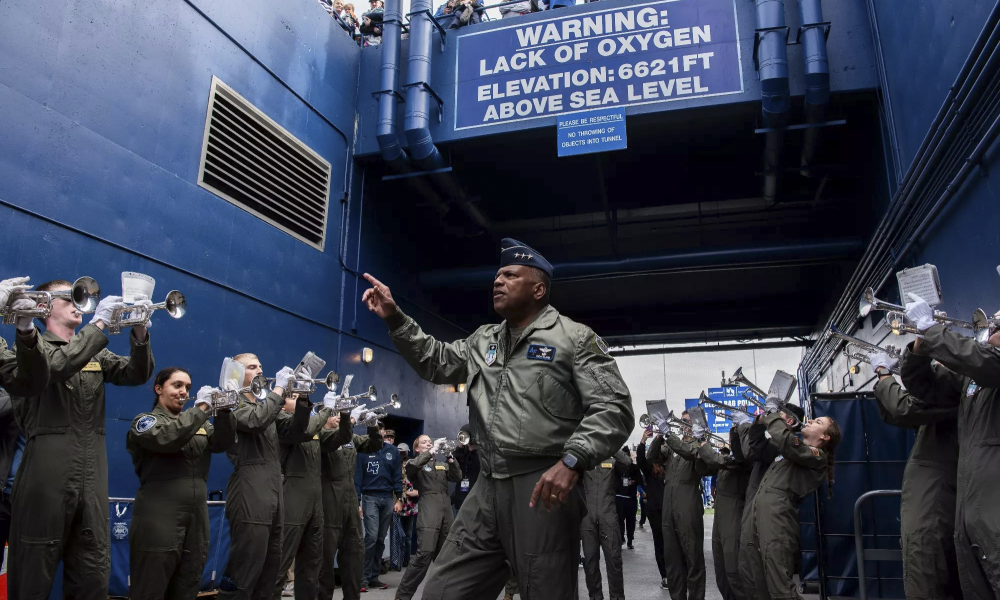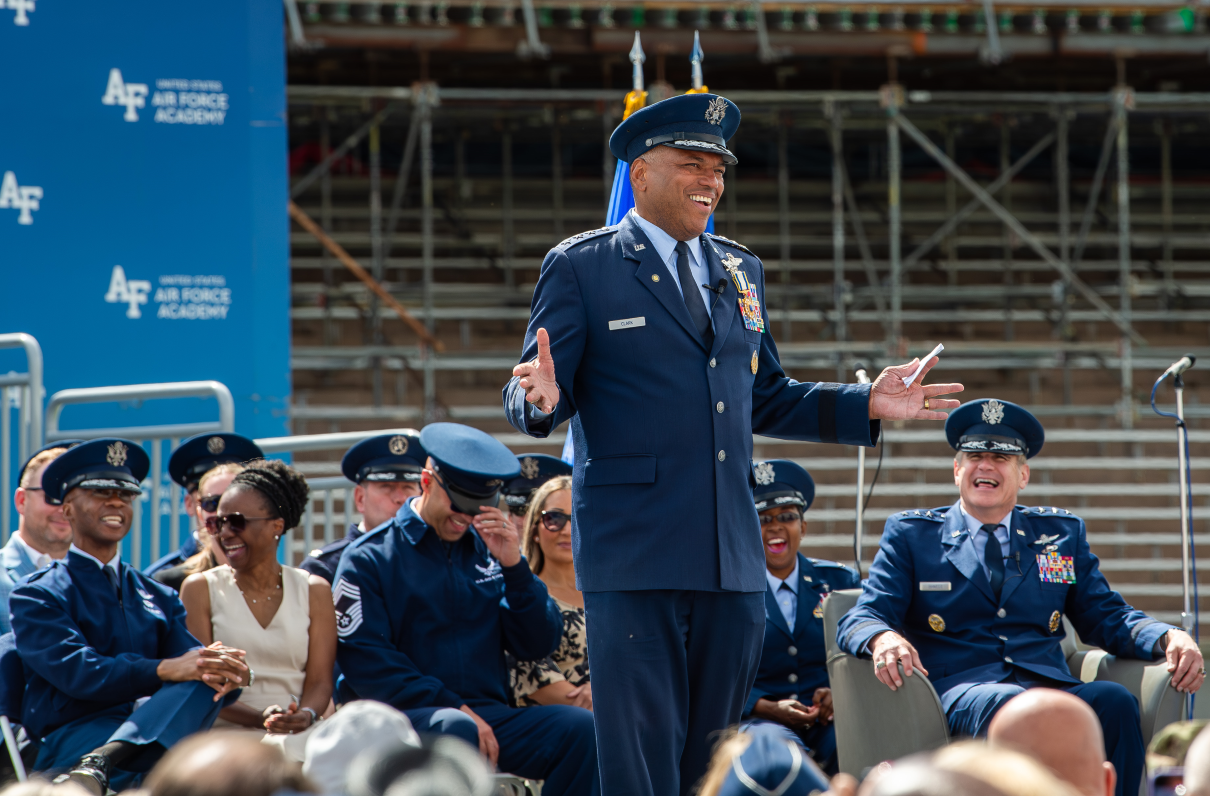(This article by Hope Hodge Seck originally appeared in the November 2024 issue of Military Officer, a magazine available to all MOAA Premium and Life members. Learn more about the magazine here; learn more about joining MOAA here.)
Lt. Gen. Richard Clark, USAF (Ret), always knew he wanted to be a pilot. But before he began flying the B-1 Lancer, he was an accomplished football star — a four-year letterman who played linebacker and noseguard for the U.S. Air Force Academy Falcons, helping carry the team to a glorious 12-1 season his senior year. Early in Clark’s career as an officer, he also coached the academy’s junior varsity football team.
So when Clark retired in May after 38 years of service from his final post as Air Force Academy superintendent to take a new position as executive director of the College Football Playoff, the move was not a strange next career choice. Rather, Clark said, stepping up to lead the entity governing college football’s postseason championship represented a “natural fit” that would bring his love of football and collegiate sports full circle.
Clark comes to his new position as the playoff moves to a 12-team format from the four teams of the past, giving more teams a shot at participating in competition. Meanwhile, a significant change is also on the horizon for military athletes, as the option for a direct path from the academies to professional sports is being eliminated in the coming year. Clark spoke with Military Officer in August about these changes, leadership insights, and life after the military. The interview responses have been edited for length and clarity.
Q. You said you were brought in to interview for the College Football Playoff as a “nontraditional” candidate. Was there anything you said that you think helped land the job?
A. There were a few things I said that I thought would have killed the deal [such as not having media or upper-level college athletics experience]. But I think what they appreciated was … I let them know that it wasn’t the first time that I was going to go into a job and not know much about it but had to figure it out walking in the door. And then they asked me a lot of leadership questions that, for us in the military, answering those questions are second nature. My message to folks out there is don’t shortchange the experiences you’ve had in the military, especially in leadership or command positions or supervisory positions. People value that out in the civilian world. Express that, and be able to tell your story about the kinds of leadership experience that you have, because it is something different than what most people get in the civilian world.

Air Force's Zac Larrier celebrates with then-Air Force Academy Superintendent Lt. Gen. Richard M. Clark after scoring a touchdown against Robert Morris University on Sept. 2, 2023. (Photo by Trevor Cokley/Air Force)
Q. What lessons in leadership did you learn in your early days on the football field?
A. You learn teamwork, and you learn how to move toward a common goal with your team and how to manage and operate within the team dynamics. You learn about adversity and how to overcome it. Working out all the things you have to do to compete, especially at a Division I level, takes a lot. And those lessons really stuck with me over the years.
And sometimes you hear the quote from [Army Gen.] Douglas MacArthur: “On the fields of friendly strife are sown the seeds that on other days, on other fields will bear the fruits of victory.” I agree with that wholeheartedly. Having been in combat and flown in combat, I will tell you there’s nothing that can replicate that. But the closest thing to it that I can think of was on the football field for me.
[CBS SPORTS: Immune to Intimidation, Richard Clark Brings Fearlessness College Football Playoff Needs to Usher in New Era]
Q. Coming from a military career of nearly four decades, what are the most unfamiliar aspects of your new role?
A. The business side of athletics is very complex and becoming even more complicated. There’s the media element that we deal with that I didn’t really have to work through much when I was in the military. And then operating in the civilian world is a little bit different than in the military world. But I think there’s also enough similarities, just from a leadership standpoint, the things that we learned in the military, that I can find those common threads and hang on to those and pull on those threads to help me to navigate some of the tough things that we deal with in college football.
Q. College football has a very passionate fan base, and you’re likely to face a fair amount of criticism. How do you think you’ll handle that?
A. My last job was superintendent at the Air Force Academy, and I was there for four years. I was criticized plenty. I feel like that job probably prepared me for this job more than any other that I had. Everybody has their ideas about how the Air Force Academy should run. You do the right thing, regardless of the criticism that you’re going to get.
In the end, your integrity has to overcome that, and your character has to drive you through. And I do believe that the military helps you in that space.

The Air Force Academy Band hypes up fans with then-superintendent Clark before a 2023 football game. (Photo by Rayna Grace/Air Force)
Q. The expansion to 12 teams provides a clearer path for the academies to reach the College Football Playoff. How do you view that change?
A. I think that the new playoff format, the 12-team format, the best thing that it does is provides access to all 134 Football Bowl Subdivision teams, because five of the nine conference champions are going to get an automatic qualification into the playoffs. That could be a service academy. There are also seven at-large bids that any team has as an opportunity to. I think it’s a harder path than the championship teams, but it’s another path. This new format does open the door for other teams that we don’t traditionally see in the playoffs. And so I think our service academies are in the hunt for, especially, that fifth championship team or one of the championship teams that get in, and I think it’s great. I’m excited about it.
Q. Do you think any of the academies could make it to the playoff in the next few years?
A. When I was playing our senior year, we were 12-1. We were ranked fifth in one poll, and we were ranked eighth in one poll at the end of the season. If the 12-team playoff had been around, then we would have been in the playoff, and we would have been able to compete for a national championship. So I will say it’s possible.
Q. Starting in 2025, a policy change will require academy athletes to serve at least two years of a military career before moving into professional sports. What are your thoughts about that?
A. Changing the rule, I believe, is a bit shortsighted. We get a huge amount of benefit when we have athletes from the academies that are playing professional sports. The media value that we get, the recruiting opportunities that we get, and just the exposure is something that we couldn’t pay for. So the value that we get out of those few people that might find themselves in a position where they could go play sports is enormous.
[RELATED: Navy Stays Atop the Academies in Annual College Rankings]
Q. What advice do you have for cadets affected by the new rules?
A. My advice to those student athletes that do have the opportunity to go pro is don’t give up on their dream. If they have that opportunity, they should take it. All of our players, all of our athletes who are getting drafted, are exceptional, and they can do it — I just think that we’re making it more difficult for them to make that jump. So I hope that we find a way to come back to the rules that we had before and stick with that policy. I think it’s much better for the department, and it’s certainly much better for those athletes.
Q. How would you sum up your leadership style and perspective?
A. If I were to give it three words: humble, approachable, and credible. Those are the things I strive to be as a leader and hope that the people that I work with see that in me. I believe in a collaborative environment where the decisions are made not just based on my knowledge, or my understanding, or my thoughts about how things should happen, but that I’m able to get the best out of the entire team, so that we can all come together and move toward that common goal.
I’ve believed that since I was a captain and a graduate of the Air Force weapons school, and I carry that with me today.
Hope Hodge Seck is a writer on military issues and is based in the Washington, D.C., area.
Military Officer Magazine
Discover more interesting stories in MOAA's award-winning magazine.
